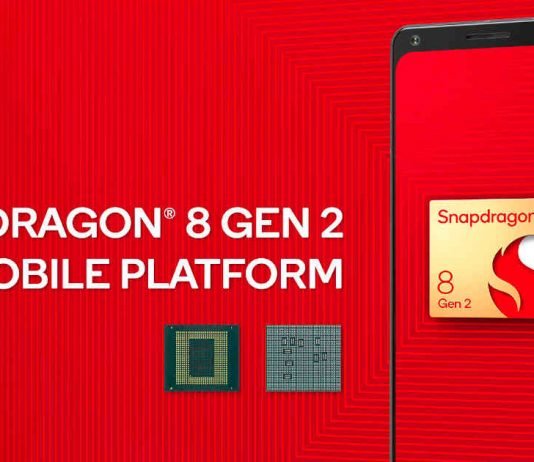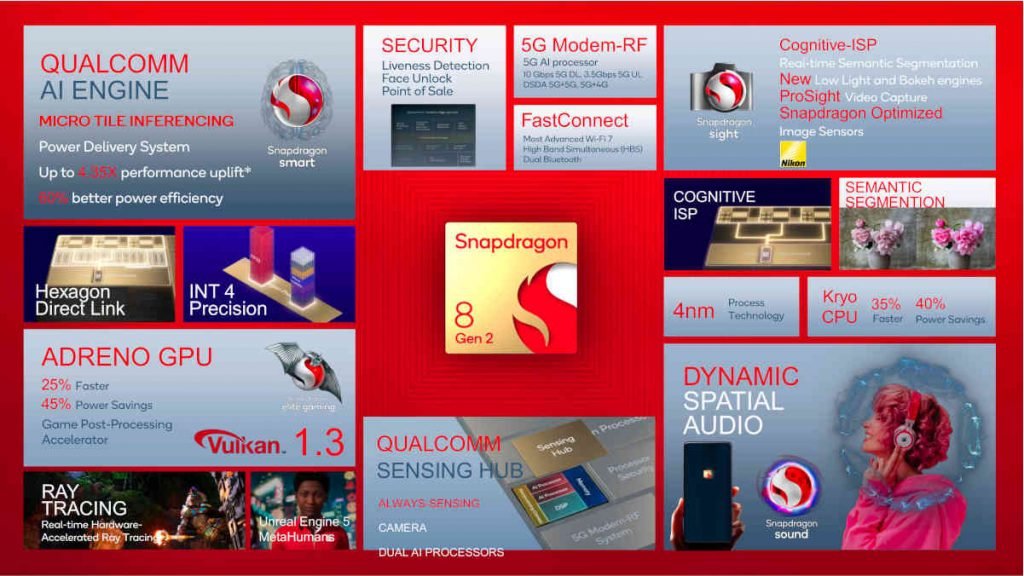Qualcomm announced the flagship chipset Snapdragon 8 Gen 2, at the Snapdragon Summit 2022. Like the Snapdragon 8+ Gen 1, the chipset is manufactured at TSMC using the 4nm EUV process.
With its 1+4+3 core configuration, the Snapdragon 8 Gen 2 is said to be faster and more efficient than the Snapdragon 8 Gen 1. Qualcomm claims a performance increase of 35% and an improvement in efficiency of 40%. The prime core is a Cortex-X3 with 3.2 GHz, and the four performance cores consist of two Cortex-A710 and two Cortex-A715 with 2.8 GHz each. The three efficiency cores are Cortex-A510 with 2 GHz.
Its latest Adreno GPU is claimed to deliver 25% faster performance and 45% more power efficiency. The Snapdragon 8 Gen 2 is the first Qualcomm chip to enable hardware ray tracing. Qualcomm is a week too late for the title of the first mobile SoC with this function — MediaTek presented the Dimensity 9200, a chipset with hardware ray tracing, shortly before the Snapdragon presentation.
With its new flagship, Qualcomm has improved Hexagon AI processor. The performance of AI-supported functions should improve by a factor of 4.35. The Snapdragon 8 Gen 2 also supports INT4 interference, which is faster but less precise than INT8. According to Qualcomm, however, there should be no significant deterioration in quality. The performance should be improved by 60%.
The SoC’s Sensing Hub should be able to process and evaluate sensor information as well as audio and video signals. The SoC should be able to react better and faster to changes in the environment. The Sensing Hub got a second AI core in the Snapdragon 8 Gen 2. With the Sensing Hub, for example, smartphones should automatically lock the display when users move away from the switched-on device.
The Snapdragon 8 Gen 2 is the first Qualcomm SoC that enables 5G on two SIM cards simultaneously — the X70 modem is integrated into the SoC. It also supports Wi-Fi 7, which Qualcomm says is a first for a mobile SoC, although Dimensity 9200 also supports Wi-Fi 7.
The Snapdragon 8 Gen 2 supports the latest LPDDR5x-4200 RAM, as well as UFS 4.0 format drives. The chip can also work with QHD+/144 Hz and 4K UHD/60 Hz displays, as well as play 8K video at 60 frames per second and supports HDR10+ dynamic range and Dolby Vision. The Snapdragon 8 Gen2 supports the AV1 codec, but currently only decoding due to legal differences.
In terms of cameras, it has a triple 18-bit ISP that can support up to three 36MP cameras at the same time, or up to 200MP for a single camera configuration. It also works with 108MP camera sensors and has no shutter lag. Qualcomm is also proud of its first “cognitive ISP”. This part of the processor is responsible for real-time image segmentation processing.
The first buyers of the chip include Asus with the ROG brand, Honor, iQOO, Motorola, Nubia, OnePlus, RedMagic, Redmi, Sharp, Sony, Vivo, Xiaomi, Xingji/Meizu and ZTE, although not all of them will be available this year will start. Qualcomm expects the first devices with Snapdragon 8 Gen 2 to appear in late 2022 and early 2023.



